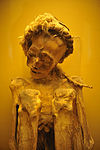Collection of mummies in the National Museum of Brazil
Appearance

The National Museum of Brazil collections include an exhibition of mummies from South American and Egyptian civilizations.[1]
The current status of the collection is unknown after the fire that destroyed the museum in 2018.
| Image | Name | Origin | Date | Notes |
|---|---|---|---|---|

|
Mummified human male head | Egypt | 1550-1070 B.C. | New Kingdom. Male, 25-45 years. |

|
Mummified head | Egypt | 1000 B.C. | Mummified head covered with black resin and wrapped with linen strips. |

|
Coffin with mummified ibis | Egypt | c. 332 B.C. | Ptolemaic Period. |

|
Coffin in the shape of a falcon with its mummy | Egypt | c. 665 B.C. | Late Period. |

|
Coffin in the shape of a cat with its mummy | Egypt | c. 332 B.C. | Ptolemaic Period. |

|
Mummified skull | Egypt | 1000 B.C. | Roman Period. |

|
Fragment of mummy cartonnage | Egypt | c. 30 B.C. - 641 A.D | Roman Period. |

|
Mummified cat | Egypt | 1st century B.C. | Roman Period. |

|
Mummified cat | Egypt | c. 30 B.C. | Ptolemaic or Roman Period. |

|
Mummy of Harsiese | Egypt | c. 1070-664 B.C. | Third Intermediate Period, XXI/XXVI Dynasties. |

|
Mummy of a child | Egypt | c. 30 B.C. - 395 A.D. | Roman Period. |

|
Mummy of a woman ("Princess Kherima") | Egypt | 1st-3rd centuries A.D. | Roman Period. |
| Mummified crocodiles | Egypt | c. 332-30 B.C. | Ptolemaic or Roman Period. | |

|
Mummified right foot | Egypt | 1000 B.C. | Roman Period. Right foot and part of leg, wrapped with thirteen strips of linen. |

|
Mummified left foot | Egypt | 1000 B.C. | Roman Period. Left foot wrapped with linen strips covered with brown resin and piece of cartonnage with squared line motif, tied to the sole with strings, probably a sandal. |

|
Sarcophagus of Sha-amun-en-su | Egypt | c. 750 B.C. | Third Intermediate Period, XXIII Dynasty. Destroyed in the 2018 fire. |

|
Mummified boy | Chile | ||

|
Atacama mummy | Chile | ||

|
Mummified skull | Shuar | [2] | |

|
Aymara mummy | Aymara people | Male, 30-40 years. | |

|
Mummified woman |
Wikimedia Commons has media related to Mummies in the Museu Nacional, Rio de Janeiro.
References
[edit]- ^ "Antropologia Biológica" (in Portuguese). National Museum of Brazil. Retrieved 6 September 2018.
- ^ "Cabeça mumificada" (in Portuguese). National Museum of Brazil. Retrieved 6 September 2018.

